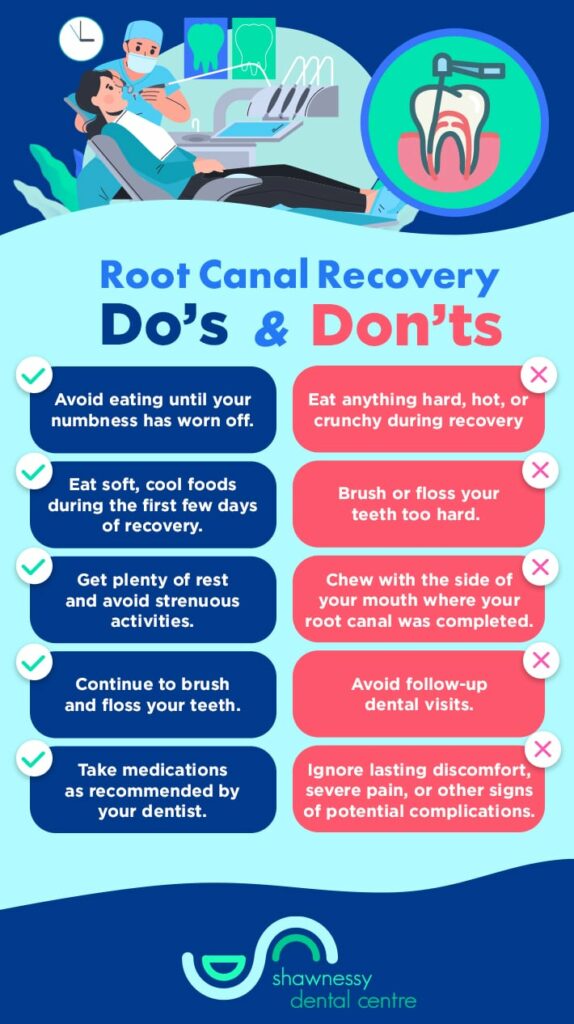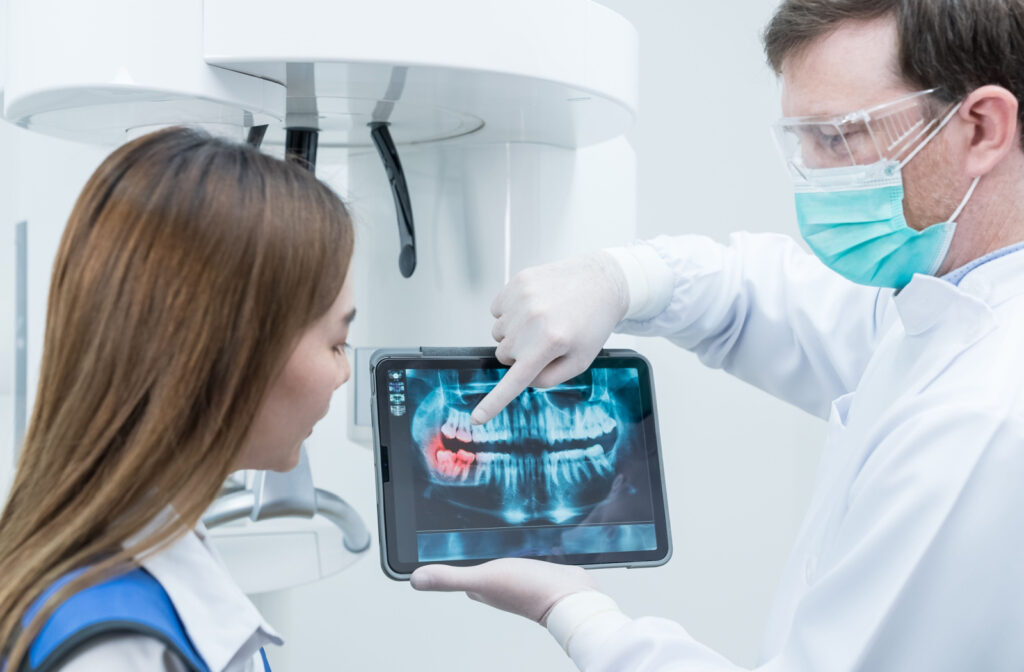Root canals can come with a lot of questions and concerns, but they can also be a path toward long-term relief from tooth pain caused by a deep infection. While each person’s recovery from a root canal can vary, ultimately, the goal is to help you get relief from badly infected or decayed teeth.
Your experience with root canal recovery can depend on your personal health and oral hygiene, but there are a few tips dentists often recommend to help support a safe, speedy recovery, including the following:
- Avoid eating right away
- Adjust your diet during recovery
- Elevate your head and use a cold compress
- Keep up with your oral hygiene
- Get some rest
- Follow up with your dentist
If you do experience unusually persistent discomfort or other complications during your root canal recovery, it’s important to schedule a dental exam. A dental visit can help you confirm that your recovery is going well and provide an opportunity to address any potential concerns you or your dentist may have.
How Long Does It Take to Recover from a Root Canal?
Root canal recovery usually takes 1–2 weeks, but each person’s experience may vary. During the first few days, you may experience mild or moderate discomfort, but that pain should decrease over time and generally only lasts for a few days.
The exact length of your recovery may also vary depending on whether your first visit included getting a permanent crown or temporary crown. Potential issues like an infection could also increase your recovery time—but that can be avoided!
Following your dentist’s guidance, making healthy choices, and continuing to take care of your teeth can be great ways to make progress toward a healthy, speedy recovery from a root canal.

Tips for a Speedy, Healthy Root Canal Recovery
Before your root canal, take some time to ask your dentist any questions you may have about what to expect during root canal recovery. We’re happy to answer your questions and provide tips to support your recovery.
In some cases, we may recommend over-the-counter medications to help with pain management, or we may prescribe antibiotics to help prevent infections. You should always take medications recommended or prescribed by your dentist as directed to avoid complications with the healing process after a dental procedure.
Avoid Eating Right Away
Most dentists recommend that you avoid eating after a root canal until the numbness in your mouth has worn off—which may take a few hours. Numbness can make it possible to accidentally chew your own cheeks or tongue and can make it difficult to know if the food you’re eating is too cold or too hot.
Adjust Your Diet During Recovery
While your gums and teeth are still sore, you may find it difficult to eat certain foods. Some foods can also pose a risk of damaging a temporary or permanent crown in the first hours and days that follow a root canal.
In general, you should avoid hard, crunchy, and hot foods. Instead, choose cool, soft foods you enjoy. As your soreness goes away and your sensitivity decreases, you may find it easier to add certain foods back to your diet.
When you’re eating, you should also try to avoid chewing with the side of your mouth where your root canal was completed—especially if you have a temporary crown.
Some of the foods we love that are also safe for root canal recovery include:
- Frozen yogurt and ice cream
- Applesauce
- Peanut butter
- Bananas
- Yogurt
- Pudding
- Mashed potatoes
- Scrambled eggs
- Soft bread
- Cooked vegetables
- Soup (not too hot!)
Elevate Your Head & Use a Cold Compress
Swelling and inflammation are both common symptoms you may experience while you recover from a root canal. Keeping your head elevated and applying a cold compress to your cheek for a few minutes at a time can help reduce those symptoms and the discomfort they may cause.
You can purchase cold compresses, or you can make a cold compress by wrapping an ice pack or a small sandwich bag of ice in a clean cloth or towel. You can apply a cold compress for up to 20 minutes, with 20-minute periods of rest in between.
Keep Up with Your Oral Hygiene
Don’t forget to keep up with your oral hygiene during your recovery! During the first few days, you can rinse your mouth with warm salt water to help avoid infections if your teeth and gums are too sore to brush and floss.
Once your soreness has worn off, you can resume regular brushing and flossing. You can (and should) also brush and floss when you have a temporary crown, but be aware that a little extra care is recommended for those areas of your mouth. Temporary crowns are not as durable as permanent crowns and damage may lead to an infection.
Get Some Rest
One of the most important tips we can give for recovering from a root canal is to get some rest. In some cases, we may recommend you avoid strenuous exercise for a few days. Excessive strenuous activity during your recovery period could slow down your recovery and increase your risk of experiencing prolonged swelling or other complications.

Follow Up with Your Dentist
It’s important to follow up with your dentist after a root canal to confirm your recovery is going well. We can recommend changes to your oral health routine and provide other tips to help support your recovery.
In some cases, you may not need a follow-up visit until it’s time for your next dental cleaning—about 6 months from your root canal. However, if you experience pain that doesn’t go away after a few days, severe pain, or other potential complications, you should schedule an appointment sooner.
Talk to Our Team About Root Canals
At Shawnessy Dental Centre, we’re always ready to support your oral health and keep you informed about how to care for it. Contact us today to learn more about root canals and schedule an appointment to receive personalized care and guidance.


